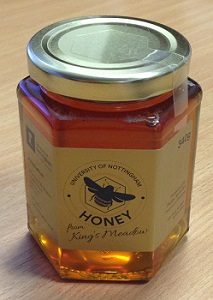 Following the popularity of last year’s University honey sales, we’re delighted to announce that the raw honey will be returning to campus outlets again this year.
Following the popularity of last year’s University honey sales, we’re delighted to announce that the raw honey will be returning to campus outlets again this year.
The honey comes from beehives located on land owned by the University. There are around 60 bee colonies in total, each housing tens of thousands of honeybees, helping to increase biodiversity and pollination. The beehives are managed on the University’s behalf by a professional bee farmer, Parks Apiaries, with hives located at Bunny Park – arable farmland south of Nottingham used for a variety of University research – and King’s Meadow Campus in Lenton.
The different landscape settings are reflected in the flavour and colour of the two varieties. Honeybees at Bunny Park collect nectar from crops such as oil seed rape and field bean, but also from trees such as horse chestnut, lime and hawthorn. The King’s Meadow honey is predominantly multi-floral, with bees foraging in the nearby King’s Meadow local nature reserve, University Park and the city centre, and potentially on farmland by the University’s Riverside Sports Complex – as honeybees can travel up to several miles in search of food.
Once extracted, the honey is bottled in its raw state. It’s simply filtered through a nylon mesh, so keeps its valuable enzymes with pollens.
New season University honey will be on sale in the following campus outlets, priced at £5.50, from Monday 25 November 2019:
- Spar shop, The Exchange, Jubilee Campus
- Hipps cafe, Medical School
- Costcutter shop, Sutton Bonington
- Portland Clothing Co, Portland Building, University Park
- Hendersans, Portland Building, University Park
- Trent cafe, Trent Building, University Park
It will also be available at a pop-up stall (cash only) on Tuesday 3 December 2019. Find us in the main entrance foyer of King’s Meadow Campus, 12-2pm or until stocks last!
There’s always a lot of interest in this limited seasonal product, so unfortunately we are unable to accept requests for bulk orders.
Proceeds from honey sales will contribute to the University’s Environment Initiative Fund, which provides grants to student or staff-led sustainability projects.
To find out more about encouraging wild bees into your garden, to help address concerns about declining bee populations and the impact on crop pollination and food security, take a look at The Wildlife Trust’s tips.
Posted on Wednesday 6th November 2019